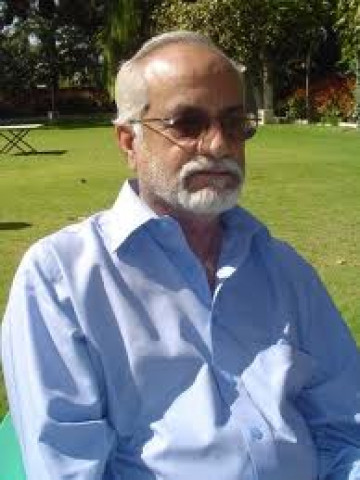RIP Asad Rehman: ‘Chakar Khan’ buried in Lahore, remembered in Balochistan
Rights activist known for joining Baloch resistance during the 1970s passes away.

Human rights activist Asad Rehman was buried in his family graveyard at Guru Mangat Road on Tuesday evening.
His nephew Taimur Rehman said Asad Rehman had been hospitalised after a heart attack 12-13 days ago. He said his lungs got infected when some fluid built up and his kidney was unable to recover after an operation. He passed away on Monday night.
Rehman, the youngest of a group of Marxists, joined the Baloch guerilla struggle in the 1970s. He was given the name ‘Chakkar Khan,’ a legendary 15th century Baloch statesman, during his stay in Balochistan.
“Chakar Khan was a name which fit his character,” Mir Muhammed Ali Talpur said. Talpur, a columnist and activist, worked as a paramedic during Rehman’s stay in Balochistan. “People today are grateful to Asad Rehman… if you visit Facebook today you will see how well he is remembered,” he said.
Rehman was part of a generation that had been affected by the break-up of East Pakistan. The silence over the injustices in Bengal and Balochistan had shaken Rehman and he defied his class upbringing to show solidarity with the Baloch during the 1970s insurgency.
“The injustices happening in Balochistan today were happening in the 1970s too. Myself, Asad [Rehman], Rashid [Rehman] and Ahmed Rashid had gone to raise a voice for the Baloch people,” Talpur said
Rehman was born in Murree on August 11, 1950. He was the son of late Supreme Court Justice SA Rahman, a member of the Boundary Commission who had worked closely with Pakistan’s founding father MA Jinnah and Lord Radcliffe. In 1969, Rehmad left to study architecture in London. Here he became part of the London Group, a study circle formed by young Pakistani Marxists studying in universities in England.
The London Group began publishing a monthly magazine titled Pakistani Nationalist, which provided an alternative perspective to the war in East Pakistan. Later, five members of the London Group quit their studies in England to return to Pakistan and join the Baloch nationalists. The group included Asad Rehman, his brother Rashid Rehman, Ahmed Rashid, Dalip Dass and Najam Sethi. Asad Rehman, Ahmed Rashid and Dalip Dass would go in the mountains to learn the language and culture of the Baloch people and join their struggle. Dass was later killed by the Pakistani security forces while the rest were granted general amnesty under Zia.
His brother Rashid Rehman, editor of Daily Times, said, “Earlier in life, in another avatar, he had been a resistance fighter and guerilla commander in Balochistan who was popularly known as Chakar. When he returned he immersed himself in human rights activism.”
“He had been a consistent advocate of Baloch rights. I have been inundated with calls from Baloch friends mourning him as one of their own,” Rashid Rehman said.
After returning in 1978, Rehman became a human rights activist associated with Aurat Foundation, the Human Rights Commission of Pakistan and more recently as an executive director of Sungi.
IA Rehman, a human rights activist and a journalist, said Asad Rehman had worked courageously to defend human rights and never let his support for the Baloch people wither.
“His work will always be remembered. He was part of a group young people who showed solidarity with the Baloch people. Till the very end his friendship with the Baloch people remained,” he said.
Published in The Express Tribune, October 31st, 2012.



















COMMENTS
Comments are moderated and generally will be posted if they are on-topic and not abusive.
For more information, please see our Comments FAQ